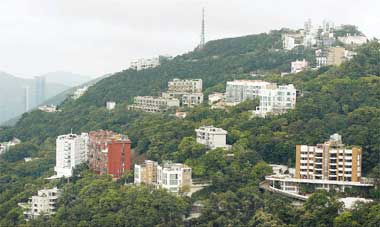For most financial market professionals in Hong Kong and other hubs across Asia, the days of extravagant expatriate life have ended. For now at least.
The standard HK$200,000 (US$25,640) per month housing allowance for top bankers is gone or going in most cases.
Paid-for chauffeurs to tote executives and their families around the steep hills of Hong Kong are scarcer, as are free memberships to exclusive golf or dinner clubs that may otherwise cost more than HK$2.1 million (US$270,960) to join.
Free private school education for the kids, roughly US$10,000 per child at international schools, is getting scaled back too.
And in another sign of lean times, corporate ships for pleasure cruises around Hong Kong's myriad beaches and outlying islands are getting auctioned off, with UBS AG among the financial institutions to recently set plans to part with its junk boat reserved for employees and clients.
|

|
|
A high-class residential area at the Peak in Hong Kong. For most financial market professionals in this city and other hubs across Asia, the days of extravagant expat life have ended. [Shanghai Daily] |
?Many banking executives from Wall Street and Europe still live a life of luxury in Asia. But for many others, the "expat" life of perks is a fading phenomenon.
"Those kind of packages will not be offered to the extent they were in the past," says Paul Lucas, vice president for real estate at Pricoa Relocation.
Starting last December, Morgan Stanley, like other Wall Street banks, began rolling housing benefits into salaries. New hires, in most cases, will not be granted housing allowances, sources inside the bank say.
Hong Kong's elite band of property agents, tasked with renting out the territory's most desired addresses including luxury condominiums and grand mansions overlooking the city's iconic harbor, have been rubbing their wounds of late.
"My record was a HK$320,000 (rent per month) mansion that was around 370 square meters with a full sea view," says a property specialist surnamed Lai who's helped senior foreign executives find luxury homes for the past 13 years.
Residential rental prices dropped, by some estimates, more than 30 percent earlier this year. Prices have stabilized, and may soon rise, but are still nowhere near the levels reached in early 2008.
"Recently though, we haven't done many deals, only those around HK$100,000 (US$12,900) rent per month," adds Lai, who could only reveal his surname given strict confidentiality agreements.
HSBC sold its junk boats several years ago but still owns bungalows spread throughout the region for off-sites and weekend getaways for employees lucky enough to be on top of the waiting list.
The cutbacks have been felt beyond Hong Kong. In Singapore, a rival expatriate haven preferred for its leafy, tropical environment and cleaner air, foreigners have also been pinched.
"It is very rare now, unless you are talking about someone at a managing director level, for someone being offered an expat package," says Craig Brewer, manager of banking and financial services at staffing firm Hudson Global Resources in Singapore.
But Singapore is less known for high-society perks compared with Hong Kong, where ostentatious displays of wealth are a part of the city's capitalist psyche. According to Brewer, most offshore recruits his firm deals with are hired on local terms.
The size of housing allowances may not seem like much for people within the financial industry. For those outside it, the numbers look staggering, especially when considering that US$5,000-US$10,000 per month will fetch a pretty nice apartment in New York City with ample space.
One Asia Pacific head of a Western investment bank who lives in Hong Kong takes in HK$375,000 per month in housing allowance alone, according to a banker who used to work for him.
In fact, at many US and European banks, the top housing allowance metric for expatriate managing directors, one of the highest levels one can reach at a bank, was around HK$200,000 per month. Even operations people within banks, who don't bring in fee revenues, could take home HK$90,000 per month.
That is changing. And while the shift may not be public, its trail is evident. Anecdotal evidence gathered in the last six months shows a herd of bankers moving from palatial flats to more modest abodes, or relocating to less exclusive and cheaper districts.
"What we've seen among some financial institutions is that they've changed their benchmarks," says Lee Quane, the Asian director of ECA International, which advises on expatriate packages and allowances.
He estimates that the average 2008-09 price for a three-bedroom apartment in Hong Kong in a mix of expat areas was around HK$90,000 per month.
These things add up.
"Benefits can sometimes be up to about two times more than the base salary of the employee for Hong Kong," says Quane.
In addition to housing and school allowances, business class air travel and free trips home used to be a given at financial institutions. For some, overseas packages even included membership to fancy recreation clubs like the Aberdeen Marina Club, where memberships can cost HK$2.1 million.
The pull-back in perks is, not surprisingly, being met with some resistance. But given the extremity of the global financial crisis, a crisis fueled in large part by banks taking on too much risk, people are generally understanding of the new policies.
"They're being backed into a corner. They don't like it but there's nowhere to go, there's no alternative," said a US fund manager and former banker, who asked not to be named. "Firms are saying we need some of your skin in this game as well."
(Shanghai Daily August 5, 2009)